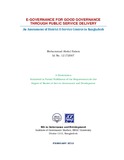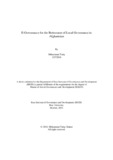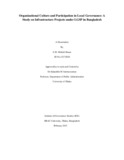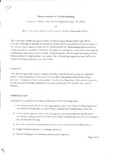| dc.contributor.advisor | Islam, Md. Zohurul | |
| dc.contributor.author | Salam, Mohammad Abdul | |
| dc.date.accessioned | 2014-08-28T09:39:25Z | |
| dc.date.available | 2014-08-28T09:39:25Z | |
| dc.date.copyright | 2013 | |
| dc.date.issued | 2013-02 | |
| dc.identifier.other | ID 12172007 | |
| dc.identifier.uri | http://hdl.handle.net/10361/3497 | |
| dc.description | This thesis is submitted in partial fulfillment of the requirements for the degree of Masters of Arts in Governance and Development, 2013. | en_US |
| dc.description | Cataloged from PDF version of thesis. | |
| dc.description | Includes bibliographical references (page 66 - 72). | |
| dc.description.abstract | E-governance is widely accepted as an effective tool of service delivery and equated with
good governance by all developed countries in general and developing countries like
Bangladesh in particular. The purpose of this study is to assess efficiency and implications of
district e-service centres of Bangladesh and validate the e-governance for good governance.
Both the qualitative as well as quantitative research approaches were conducted. Data was
collected using self-administered questionnaire from random samples drawn from the
population of service providers individuals provide services and service receivers take
receives from four different DESCs of Bangladesh. The constructs in this study were
developed by using measurement scales adopted from prior studies. Data were analyzed using
MS Excel and SPSS Program.
Efficiency of DESC was assessed by choice & consultation, courtesy & consultation, openness
& transparency, entrance & information, openness & transparency and value for money while
the level of citizen satisfaction was measured through attenuation of corruption, intensity of
clarity, efficiency of service, level of convenience, extent of accessibility and altitude of
interaction. The good governance is assessed by accountability, transparency, responsiveness,
rule of law, effectiveness and participation. Due to e-governance initiative entrance and
information in e-governance service, extent of accessibility in citizen satisfaction and
effectiveness in good governance showed the high level of advancement.
The study results revealed that the DESC provides public services efficiently, the e-service
delivery has positive impacts on citizen satisfaction and the e-governance initiative leads to
good governance promises impending to validation of hypothesis. An understanding of the
current status of e-governance service in Bangladesh can help to policy makers and policy
implementers in persuasion of the public service delivery properly. This is believed the
comprehensive analysis on e-service centres would be imperative for assessment the
effectiveness for delivery of e-government services. This study and their results have some
limitations and also indicate directions for further research towards better governance. | en_US |
| dc.description.statementofresponsibility | Mohammad Abdul Salam | |
| dc.format.extent | 91 pages | |
| dc.language.iso | en | en_US |
| dc.publisher | BRAC University | en_US |
| dc.rights | BRAC University thesis reports are protected by copyright. They may be viewed from this source for any purpose, but reproduction or distribution in any format is prohibited without written permission. | |
| dc.subject | Governance and development | en_US |
| dc.subject | E-governance | en_US |
| dc.subject | Good governance | en_US |
| dc.subject | Public service delivery | en_US |
| dc.subject | E-service | en_US |
| dc.title | E-governance for good governance through public service delivery: an assessment of district e-service centres in Bangladesh | en_US |
| dc.type | Thesis | en_US |
| dc.contributor.department | Institute of Governance Studies, BRAC University | |
| dc.description.degree | M. Governance and Development | |




